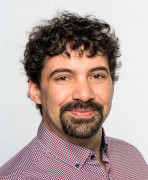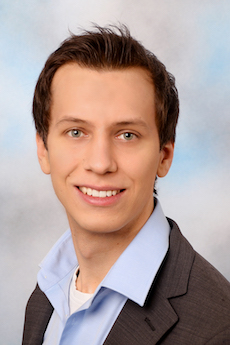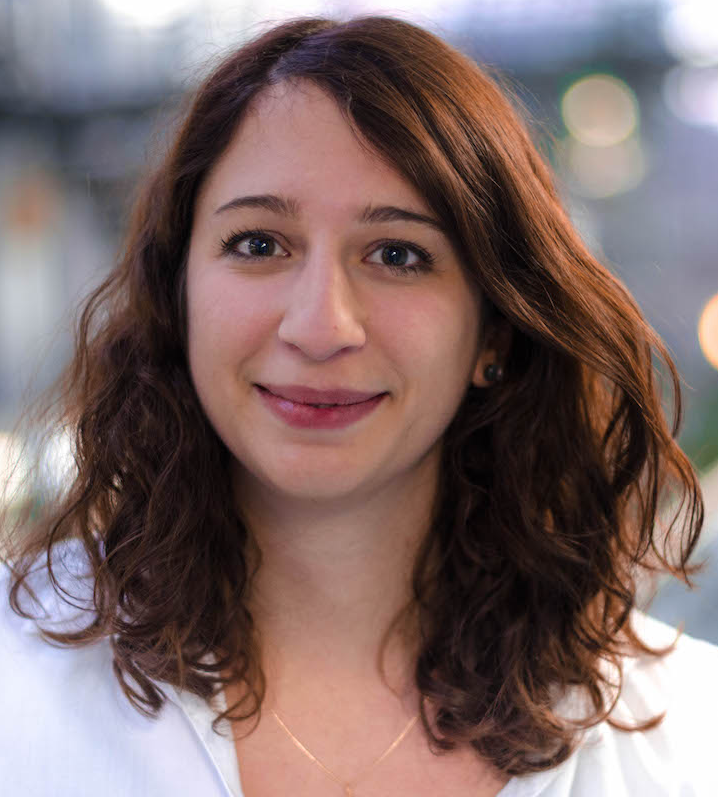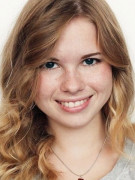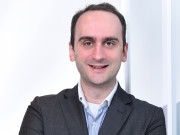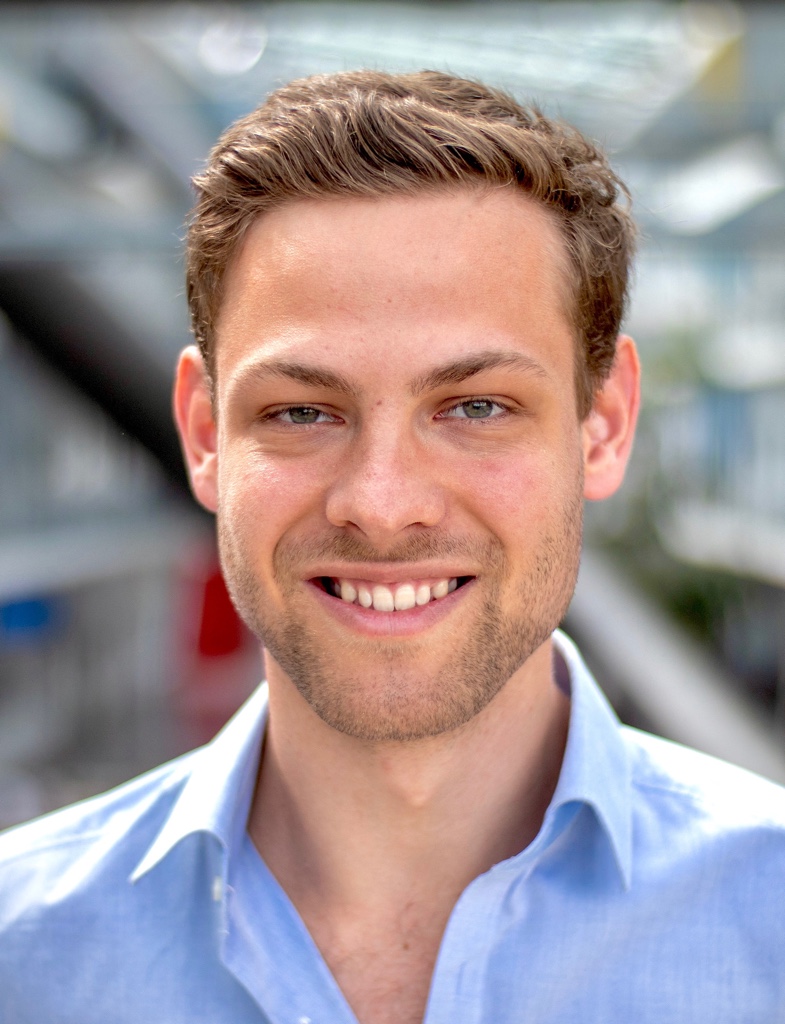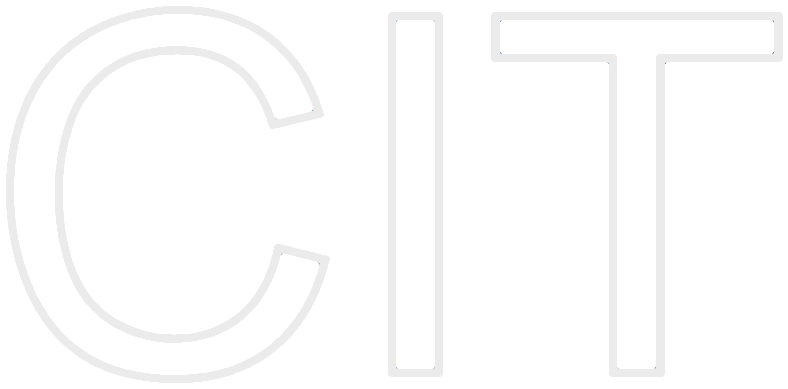
|
Project:
Deutsches Herzzentrum
The Heart Risk Manager
is an App that helps users better
understand and improve their cardiovascular health.
Different scientific risk-scores based on the users health
data are calculated and presented. The accumulated
data can then be donated to researchers and only after
giving permission, the users personal data will leave the
device.
Team members: Snezhina Milusheva, Prof. Dr.
Stephan Jonas (Project
Leads), Johannes Christler (Coach), Chantal Selim, Alla Sergeeva, Thomas Haefeker, Anais
Hadjistavrou, Linda Wiedemann, Veronika Hoffmann, Youssef Hammad
Customers: Dr. med. Fabian
Starnecker
|
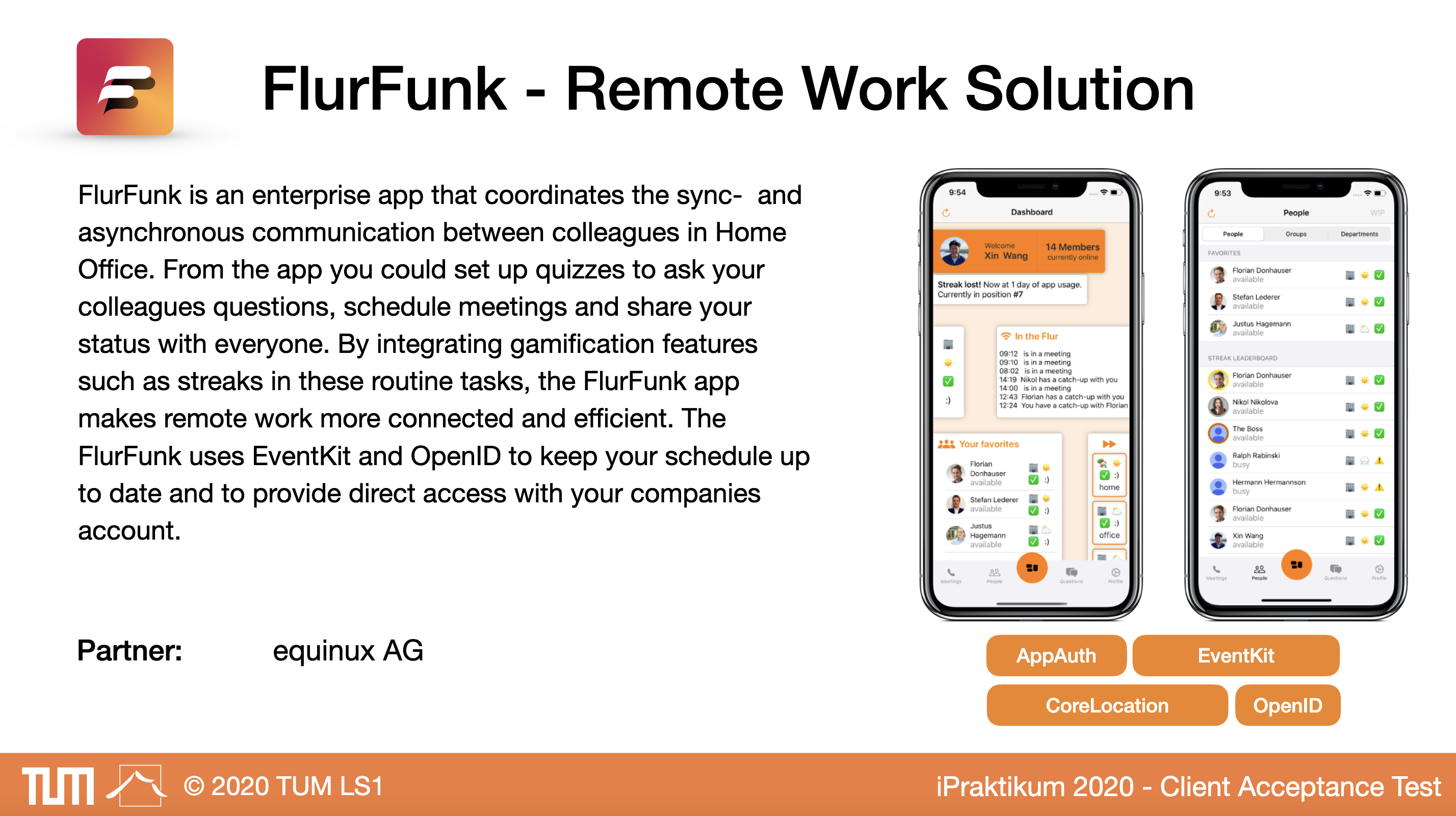
|
Project:
Equinux
FlurFunk is an
enterprise app that coordinates the sync- and
asynchronous communication between colleagues in Home
Office. From the app you could set up quizzes to ask your
colleagues questions, schedule meetings and share your
status with everyone. By integrating gamification features
such as streaks in these routine tasks, the FlurFunk app
makes remote work more connected and efficient. The
FlurFunk uses EventKit and OpenID to keep your schedule up
to date and to provide direct access with your companies
account.
Team members: Philipp Eichstetter, Paul
Schmiedmayer
(Project Leads),
Eldi Cano (Coach), Florian Donhauser, Nikol Nikolova, Benjamin Pabst, Justus Hagemann,
Stefan Lederer, Xin Wang
Customers: Till Schadde, Adrian Thomas, Maximilian
Szengel
|
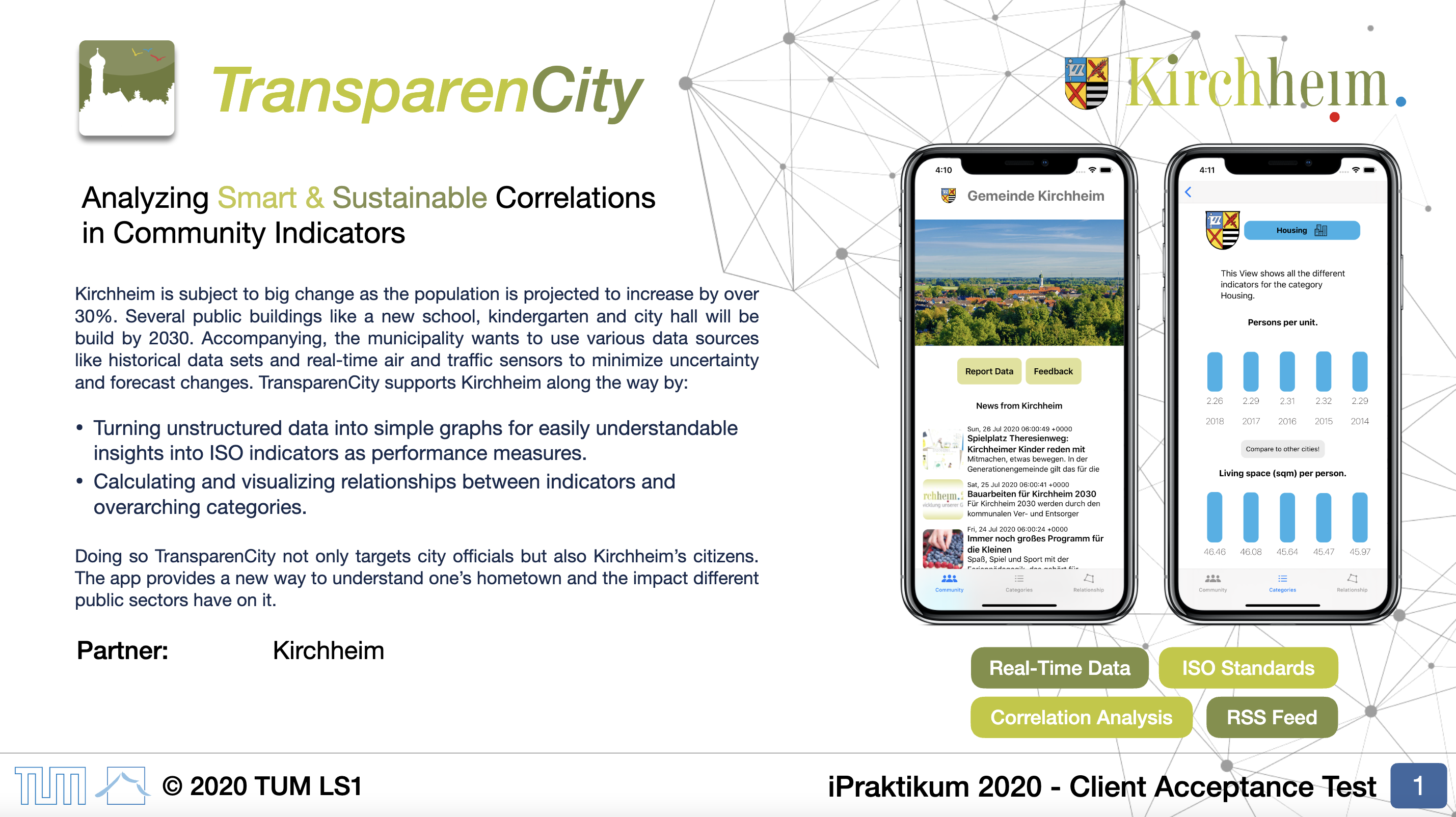
|
Project: Gemeinde
Kirchheim
Kirchheim is subject to
big change as the population is projected to increase by over
30%. Several public buildings like a new school, kindergarten and city hall will be
build by 2030. Accompanying, the municipality wants to use various data sources
like historical data sets and real-time air and traffic sensors to minimize uncertainty
and forecast changes. TransparenCity supports Kirchheim along the way by turning
unstructured data into simple graphs for easily understandable
insights into ISO indicators as performance measures and calculating and visualizing
relationships between indicators and
overarching categories.
Team members: Mariana Avezum (Project
Leader), Jakob Smretschnig (Coach), Olena Galitska, Carina Fröhlich, Swornim Shrestha,
Adrian Fischer, Nicolai Wiskemann, Victor Pacyna
Customers: Tobias Schock
|
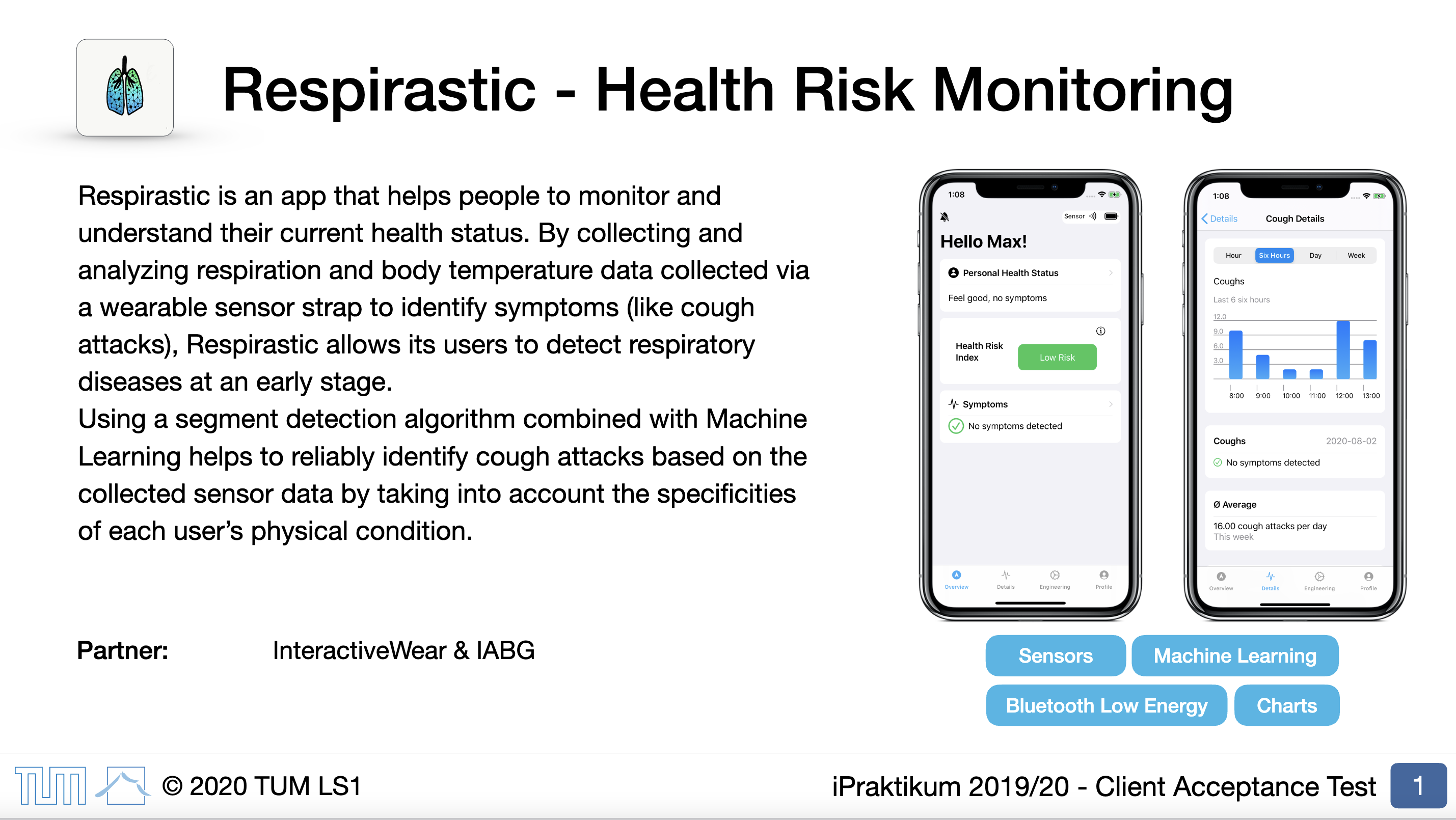
|
Project:
Interactive Wear
Respirastic is an app
that helps people to monitor and
understand their current health status. By collecting and
analyzing respiration and body temperature data collected via
a wearable sensor strap to identify symptoms (like cough
attacks), Respirastic allows its users to detect respiratory
diseases at an early stage.
Using a segment detection algorithm combined with Machine
Learning helps to reliably identify cough attacks based on the
collected sensor data by taking into account the specificities
of each user’s physical condition.
Team members: Sajjad Taheri
(Project
Leader), Jessica Saroufim (Coach), Roman Canals, Franziska Tobisch, Dominik Eisl, Dominik
Moehrle, Ryan Stanley
Customers: Claus Pribbernow, Dr. Christof
Stoenner
|
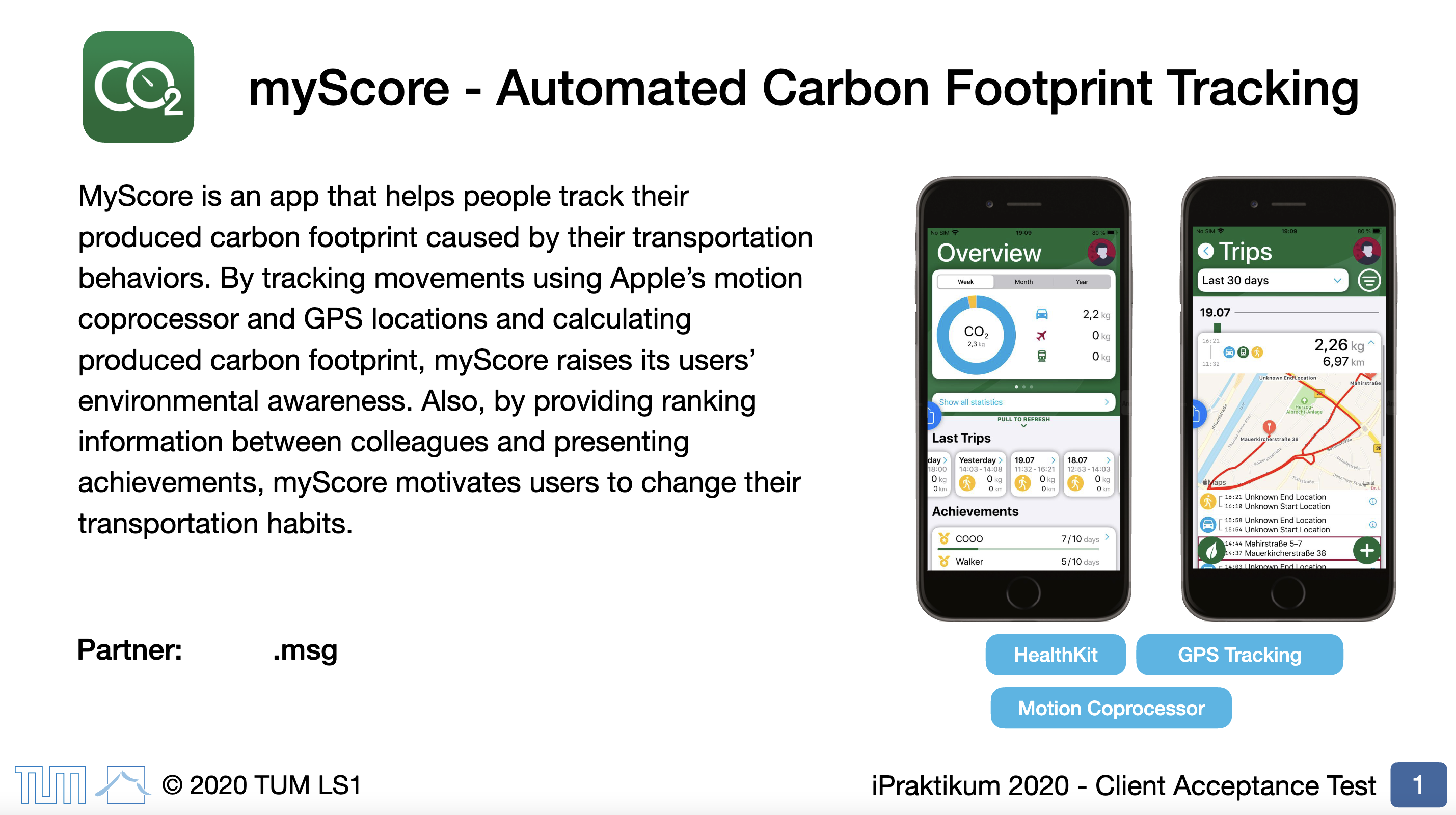
|
Project:
MSG
MyScore is an app that
helps people track their
produced carbon footprint caused by their transportation
behaviors. By tracking movements using Apple’s motion
coprocessor and GPS locations and calculating
produced carbon footprint, myScore raises its users’
environmental awareness. Also, by providing ranking
information between colleagues and presenting
achievements, myScore motivates users to change their
transportation habits.
Team members: Dominic Henze
(Project
Leader), Leonard Endriß (Coach), Philipp Kolberg, Katharina Prantl, Ndricim Rrapi, Cagla
Balcik, Lorenz Huber, Veselina Vazova
Customers: Oliver Feldmann, Stephan Martin
|
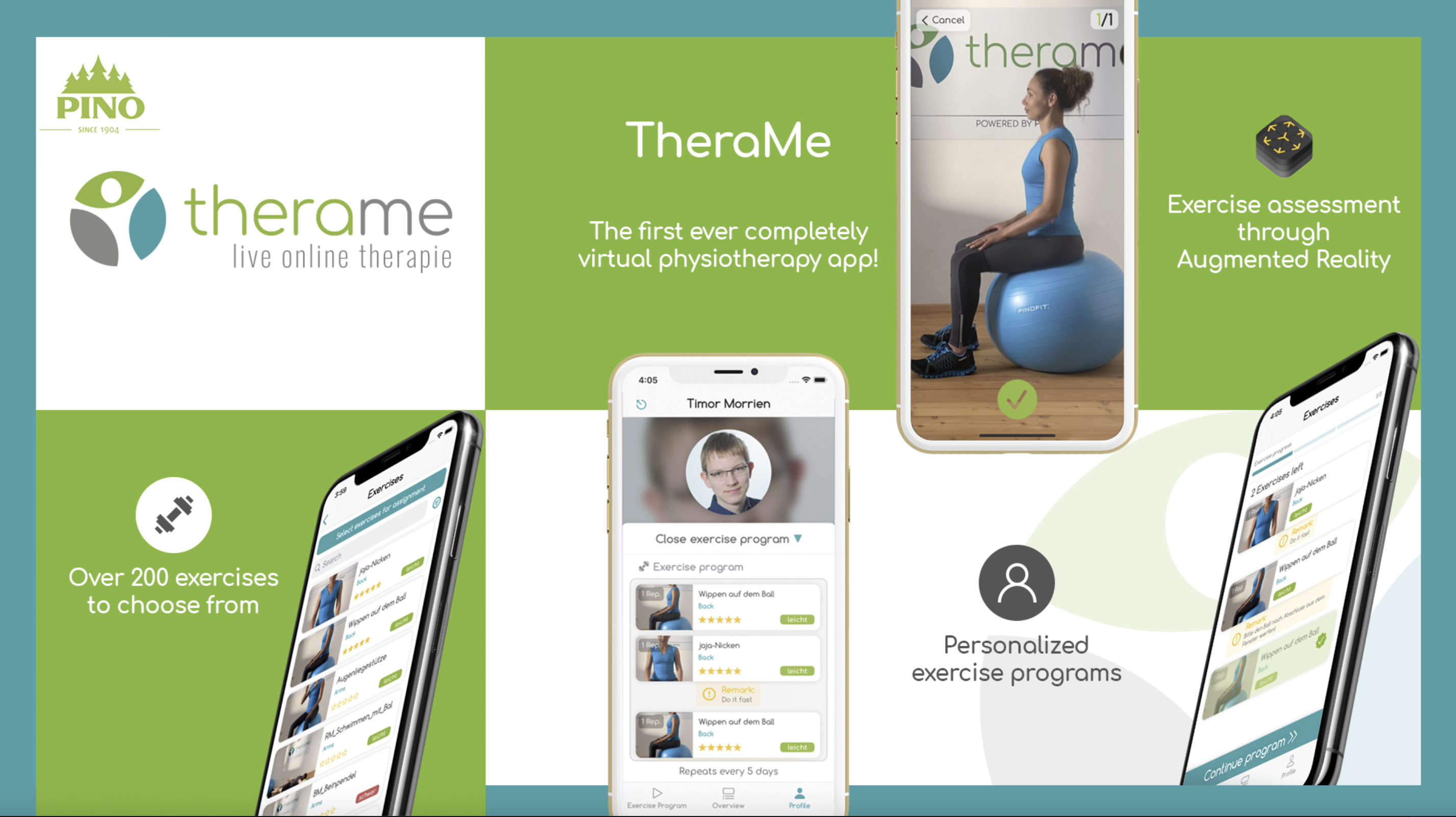
|
Project:
PINO
The PINO TheraMe iOS
application provides a solution for physiotherapists and their patients to
conduct physiotherapy remotely. This is made possible by providing distinct features for both the
therapist and the patient and can be beneficial especially throughout the Corona pandemic. In
addition, it can support patients from rural areas to get fast access to physiotherapy and tackles
the
shortage of therapists in general and especially outside cities.
Therapists have the ability to configure individualized exercise programs for their patients.
Patients
can then conduct their program and leave ratings for single exercises or the whole workout plan. The
exercise execution can be supported by augmented reality features which allow patients to check for
the correct range of motions within their exercises.
Team members: Lara Marie Reimer
(Project Leader),
Klaudia Madhi (Coach), Hanya Elhashemy, Justin Möhlmann, Timor Morrien, Arno Claude, Lena
Pigat, Noah Raissi
Customers: Janine Schmidt, Carsten
Boss
|
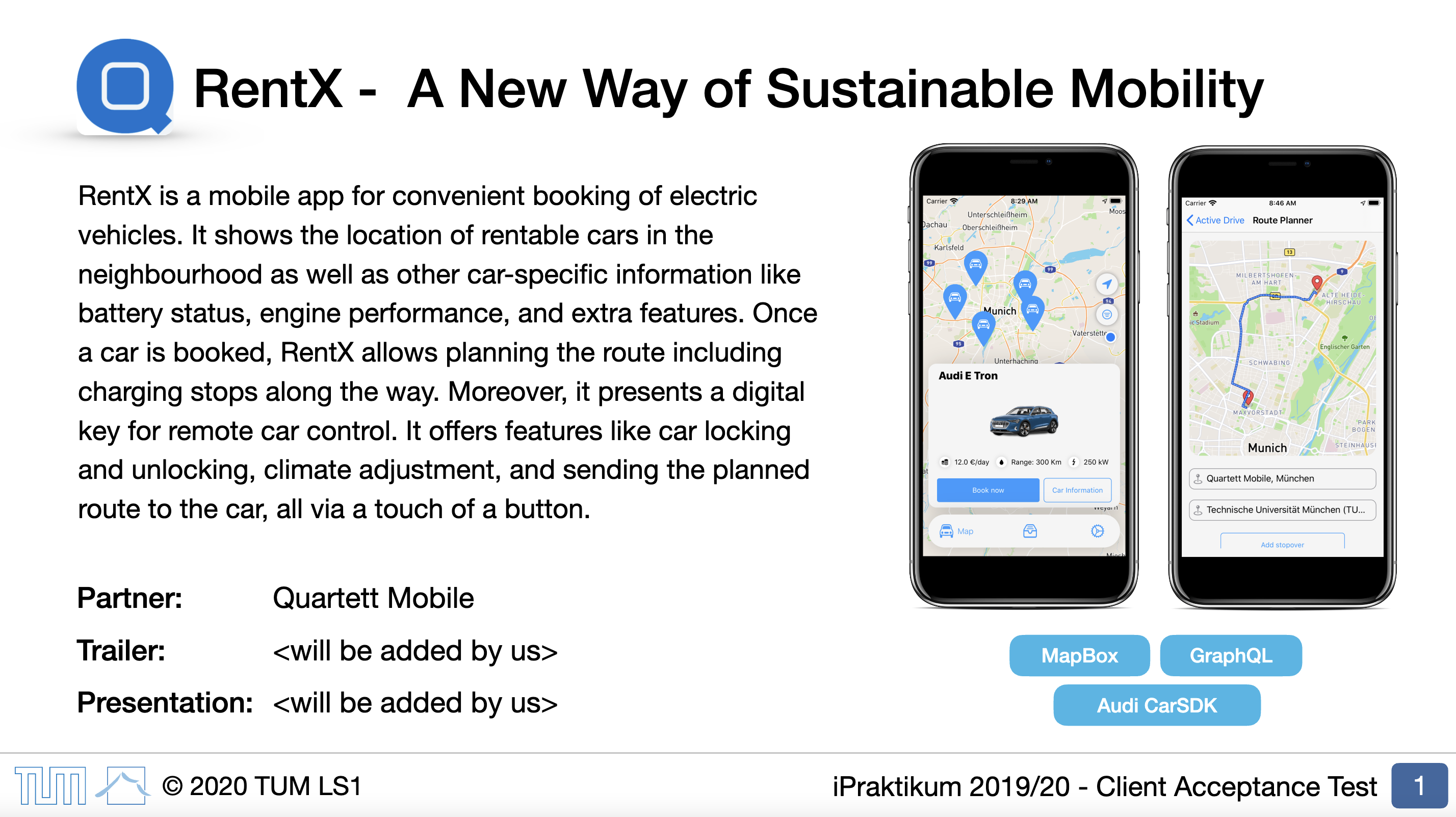
|
Project:
Quartett Mobile
RentX is a mobile app
for convenient booking of electric
vehicles. It shows the location of rentable cars in the
neighbourhood as well as other car-specific information like
battery status, engine performance, and extra features. Once
a car is booked, RentX allows planning the route including
charging stops along the way. Moreover, it presents a digital
key for remote car control. It offers features like car locking
and unlocking, climate adjustment, and sending the planned
route to the car, all via a touch of a button.
Team members: Jens Klinker (Project Leader),
Tetiana Zubko (Coach),
Käthe Vrettos, Georgiana Barbut, Robin Franke, Haifa Haddad, Joe Yu, Sebastian
Liedl
Customers: Leon Von Tippelskirch, Tobias
Klüpfel
|
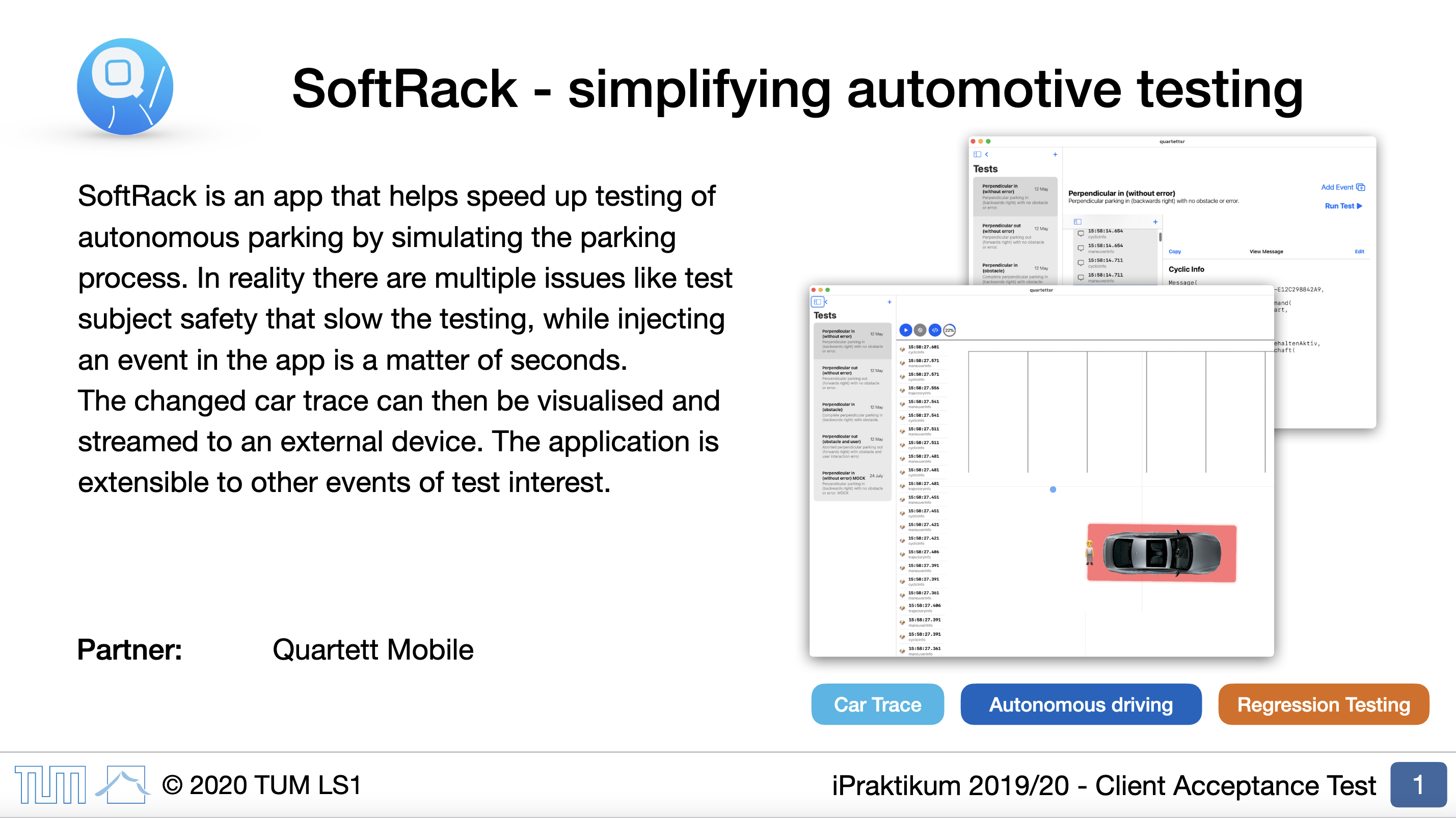
|
Project:
Quartett Mobile
SoftRack is an app that
helps speed up testing of
autonomous parking by simulating the parking
process. In reality there are multiple issues like test
subject safety that slow the testing, while injecting
an event in the app is a matter of seconds.
The changed car trace can then be visualised and
streamed to an external device. The application is
extensible to other events of test interest.
Team members: Prof. Dr. Bernd Brügge (Project
Leader),
Maximilian Sölch (Coach), Kevin Bello, Philipp Friedrich, Manuel Brauchle, Alexander Berger,
Johannes Friedlein, Ondřej Šebek
Customers: Leon Von Tippelskirch, Michael
Schmitt
|
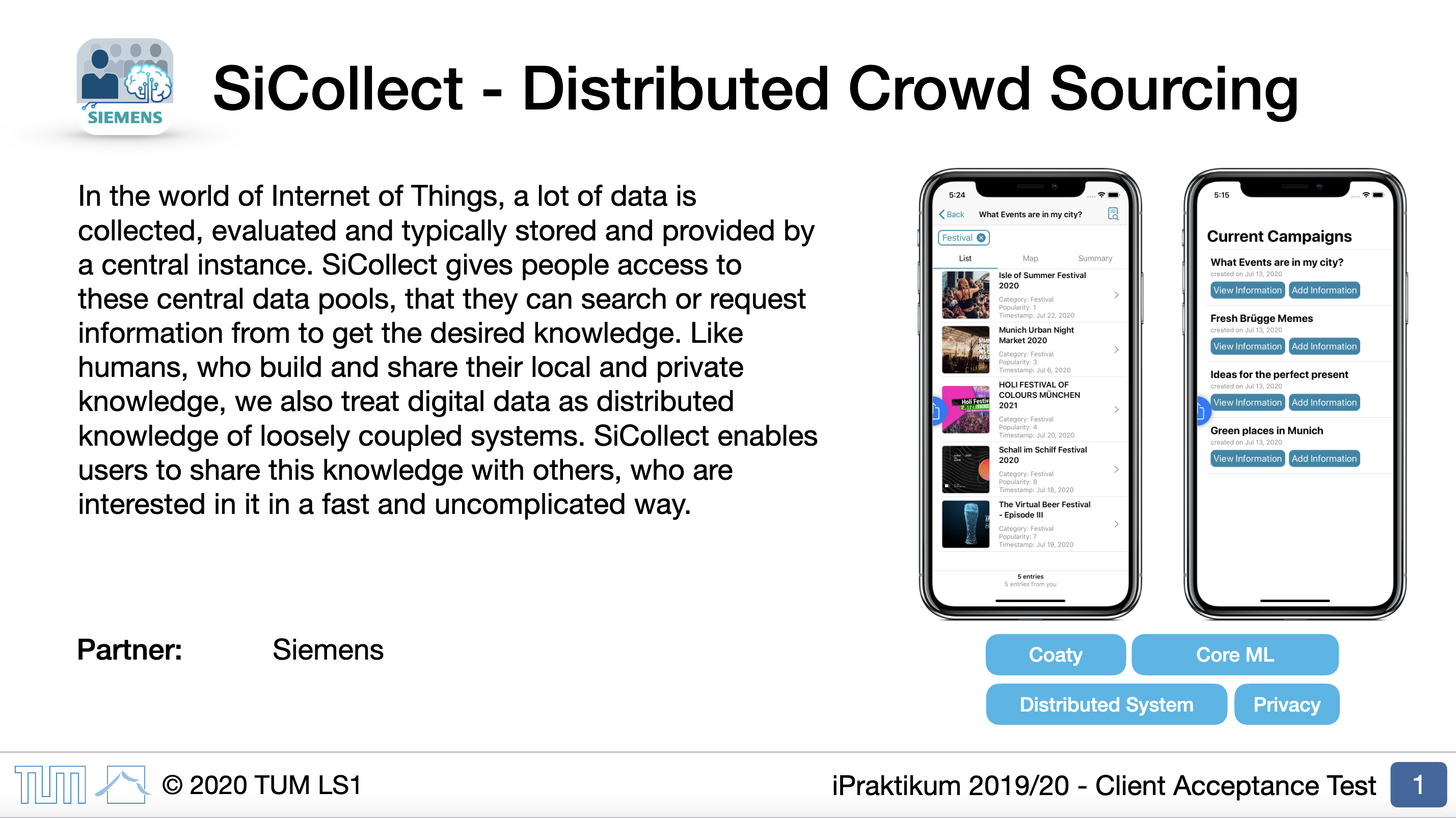
|
Project:
Siemens
In the world of Internet
of Things, a lot of data is
collected, evaluated and typically stored and provided by
a central instance. SiCollect gives people access to
these central data pools, that they can search or request
information from to get the desired knowledge. Like
humans, who build and share their local and private
knowledge, we also treat digital data as distributed
knowledge of loosely coupled systems. SiCollect enables
users to share this knowledge with others, who are
interested in it in a fast and uncomplicated way.
Team members: Florian Bodlée
(Project Leader),
Yevheniya Vytruchenko (Coach), Finn Capelle, Nan Wu, Leonard Giglhuber, Jakob Kempter,
Andreas Dachsberger, Cesar Puebla Alvarez
Customers: Jochen Nickles, Dr. Markus
Sauer
|
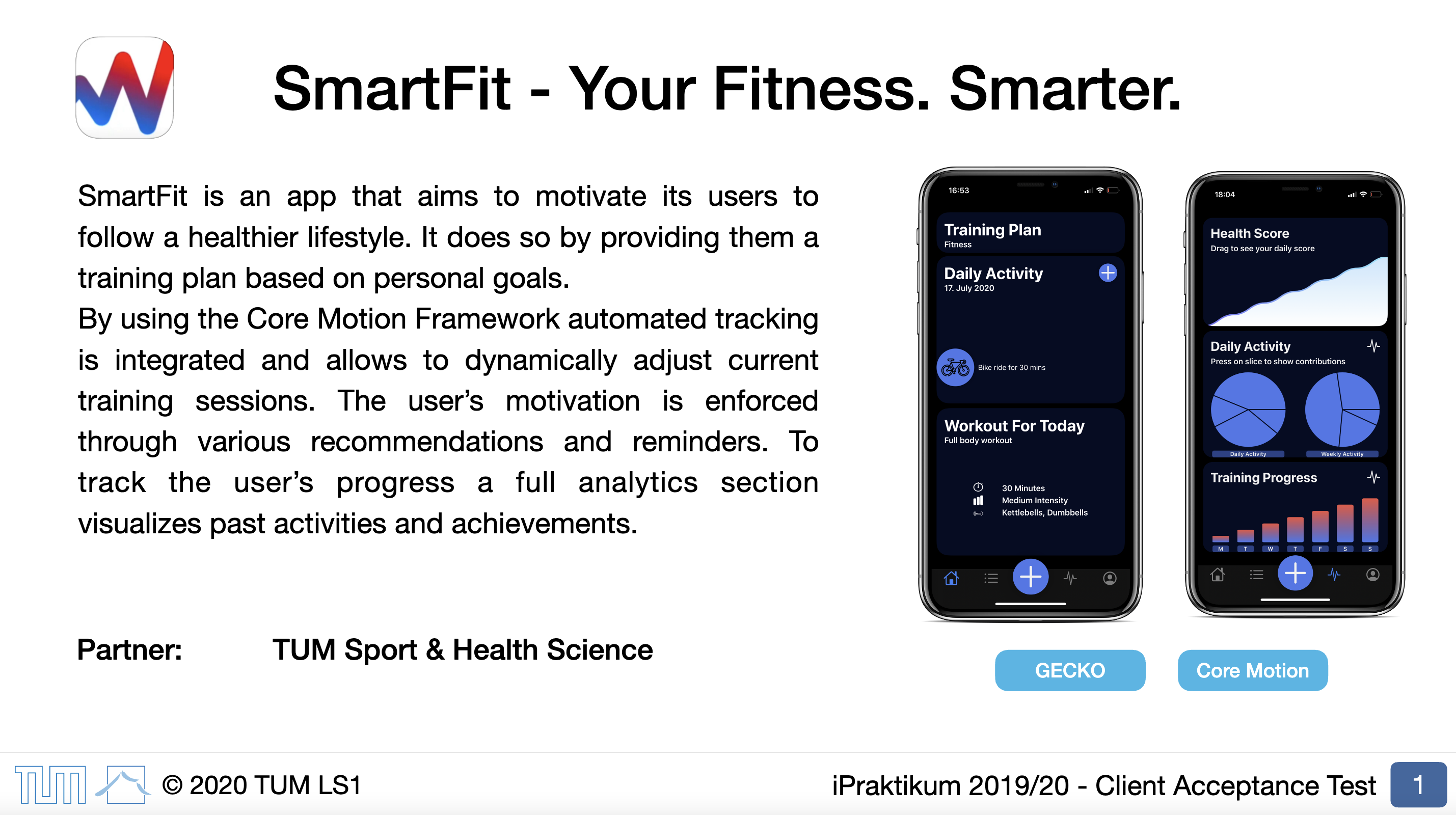
|
Project:
TUM Sport & Health Sciences
SmartFit is an app that
aims to motivate its users to
follow a healthier lifestyle. It does so by providing them a
training plan based on personal goals.
By using the Core Motion Framework automated tracking
is integrated and allows to dynamically adjust current
training sessions. The user’s motivation is enforced
through various recommendations and reminders. To
track the user’s progress a full analytics section
visualizes past activities and achievements.
Team members: Marko Jovanović
(Project Leader),
Richard Pfannenstiel (Coach), Maurice Brenner, Sonja Deißenböck, Ixhen Hasani, Christoph
Stadt, Michaela Springer, Moritz Wolf
Customers: Dr. Florian Kreuzpointner, Florian
Grigoleit
|
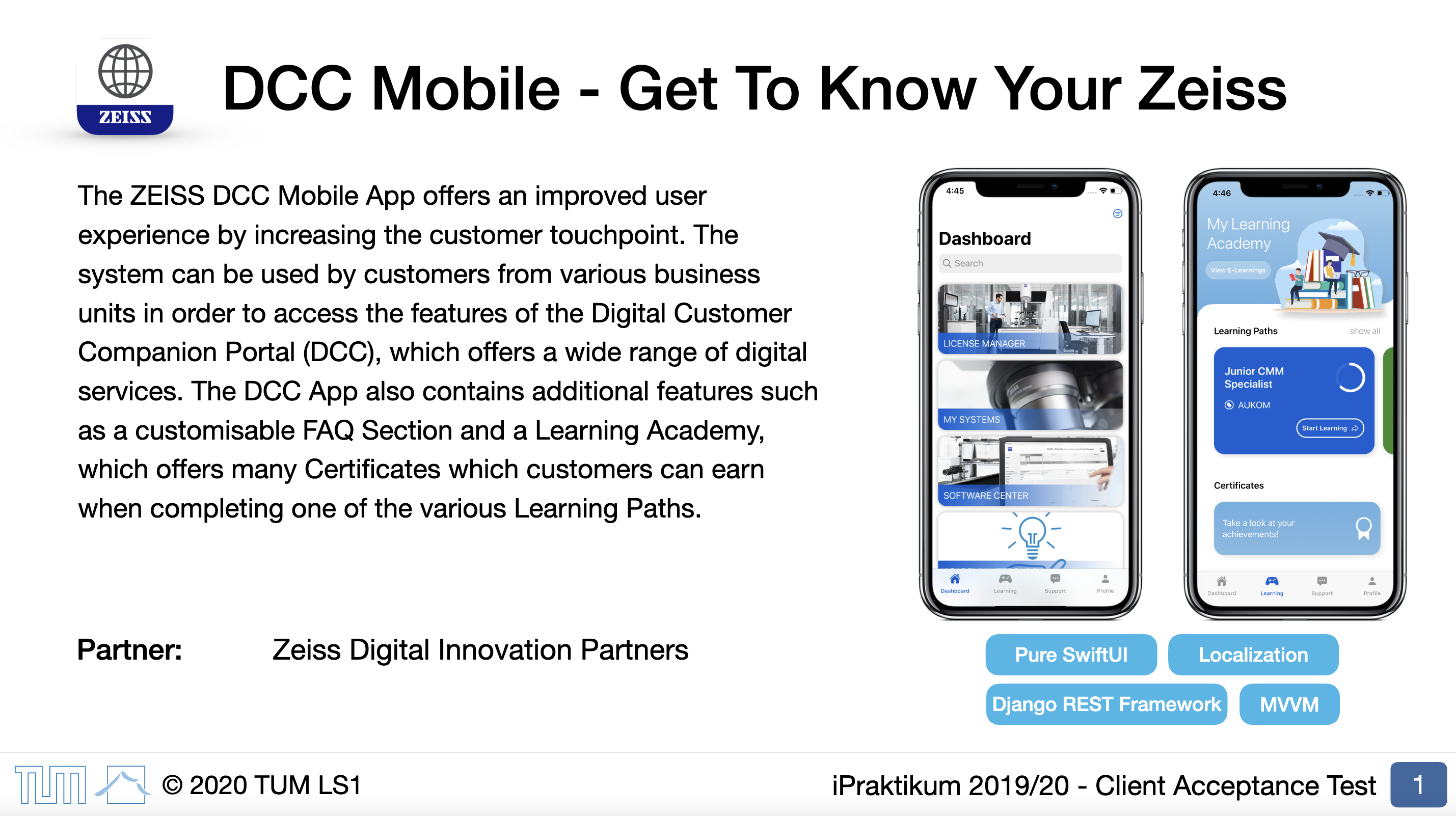
|
Project:
ZEISS
The ZEISS DCC Mobile App
offers an improved user
experience by increasing the customer touchpoint. The
system can be used by customers from various business
units in order to access the features of the Digital Customer
Companion Portal (DCC), which offers a wide range of digital
services. The DCC App also contains additional features such
as a customisable FAQ Section and a Learning Academy,
which offers many Certificates which customers can earn
when completing one of the various Learning Paths.
Team members: Dr. Dora Dzvonyar
(Project Leader),
Joana Becheva (Coach), Julian Baumann, Carolin Weber, Kilian Eisert, Ron Schlichting, Tobias
Pechatschek
Customers: Klaidi Gorishti, Matthias
Gohl
|
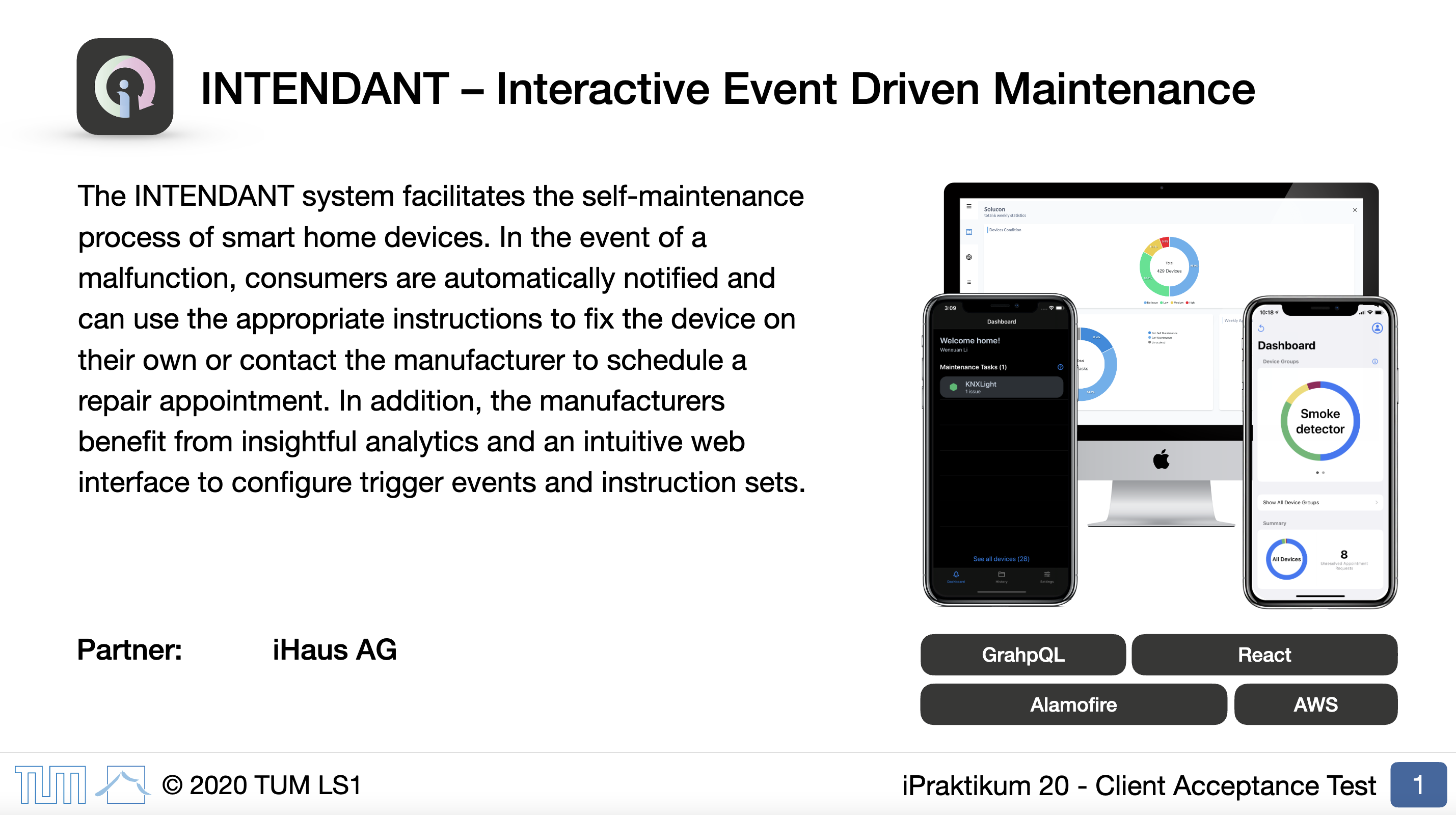
|
Project:
iHaus
The INTENDANT system
facilitates the self-maintenance
process of smart home devices. In the event of a
malfunction, consumers are automatically notified and
can use the appropriate instructions to fix the device on
their own or contact the manufacturer to schedule a
repair appointment. In addition, the manufacturers
benefit from insightful analytics and an intuitive web
interface to configure trigger events and instruction sets.
Team members: Dr. Jan Ole Johanssen
(Project Leader),
Simon Borowski (Coach), Leon Nissen, Jing Huang, Patrick Bassner, Marisol Barrientos,
Mohammed Dwedari, Wenxuan Li
Customers: Ralf Pfleghar, Nicolas
Vorwerg
|

